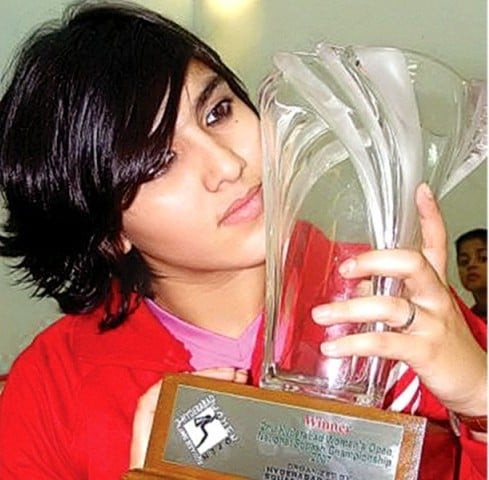It is not very often, if at all, that we hear about women, especially from this part of the world, who have managed to break strict cultural norms and traditions in order to pursue a career in sports, much less a career in anything.
I admit that when I first heard Maria’s story I was completely spellbound; her story is not only that of strong will and determination, but it is also profoundly inspirational!
She literally stopped at no lengths to pursue her love of playing squash, even if it meant giving up her identity completely and disguising herself as a boy!
She is now currently on her way to becoming the top squash player in the world, proving that Pashtun women are more than capable of achieving anything as long as they are given the opportunity.
Consequently, in a world where a male child is prized and a female child mourned, it would make sense for some Pashtun families to pass off their female children as boys and there are many reasons for this, including economic need, the social pressure to have sons, and in some cases, a superstition or belief that doing so will finally lead to the birth of a real boy.
Yet, that wasn’t necessarily Maria’s case, for she wanted to be a boy and in doing so she went as far as burning all her dresses and chopping off her hair; she even changed her name from Maria to Genghis Khan.
Even though she was very young, perhaps, just perhaps, she intuitively knew that pretending to be a boy would allow her the many freedoms and liberties that would otherwise have been denied to her had she continued on as a girl.
However, not all Pashtun women get as lucky as Maria, nor do they attain opportunities, if any, to go to school and pursue a career of their choice. Had Maria led a typical life, she would have surely been married off by as early as ten or 11-year-olds (as it is the norm); her life would have been limited to the household, completely hidden from the world, and the only way she would have been able leave her house was if she was fully covered from head to toe, in a shuttlecock burqa, accompanied by a male family member.
Undoubtedly, this is the harsh reality that women from that part of the world have to face on a daily basis and most have even accepted this reality, believing it to be the model life that all women must abide by, throwing any or all defiance to the wind.
Hence, rebellion of any sort is never an option, much less considered, for the consequences would often be quite ominous.
Nevertheless, Maria has had her share of struggles that she managed to overcome, over the years – mainly that of maintaining honour, while at the same time being insulted and taunted for being a girl, receiving death threats, and living and playing squash in hiding to ensure her personal safety.
Even so, it was through the help and support of her wonderful father, Shamsul Qayyum Wazir – an elder tribesman, a true Pashtun, and a strong advocate for women’s rights – that she was able to gain confidence and come as far as she has in her exertion against oppressive forces, which would have otherwise denied her the life that she leads today.
There is no doubt that Maria’s story is unique and empowering to many Pashtuns, as well as other women from all around the world, who are living in highly patriarchal and conservative societies that deny them the ability to express their freedom, talents and individuality.
Yet, at the same time, here’s to hoping that Maria’s story will continue to inspire Pashtuns – both men and women alike – to break free from the chains that they have been confined to, for baseless rules are meant to be broken in order to attain the freedom and independence that we all so greatly yearn. As she says in her great words:
“I am a warrior, I was born a warrior and I will die like a warrior.”
Maria is indeed a ray of light – a glimmer of hope in a land that’s been plunged into darkness for far too long.
Read more by Samar here or follow her on Twitter @sesapzai



COMMENTS
Comments are moderated and generally will be posted if they are on-topic and not abusive.
For more information, please see our Comments FAQ